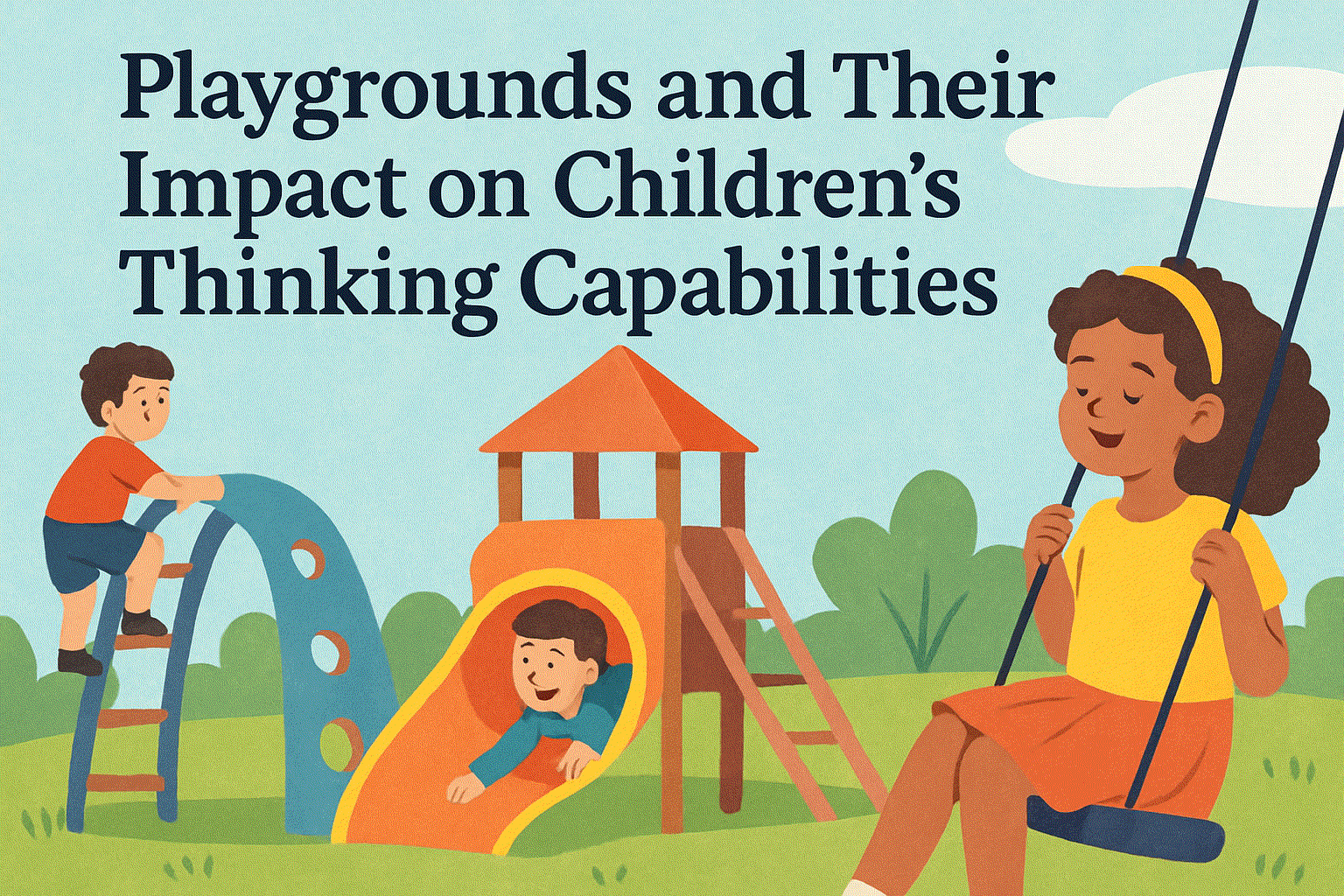The Comprehensive Guide to Toys for One-Year-Olds
Overview of Playgrounds as Learning EnvironmentsPlaygrounds serve as essentia...

Add description, images, menus and links to your mega menu
A column with no settings can be used as a spacer
Link to your collections, sales and even external links
Add up to five columns
Add description, images, menus and links to your mega menu
A column with no settings can be used as a spacer
Link to your collections, sales and even external links
Add up to five columns

Playgrounds serve as essential spaces for children's cognitive and social development. These environments are more than just recreational areas; they play a significant role in enhancing thinking capabilities through various forms of play. When children engage in outdoor activities, they experience numerous benefits that contribute to their growth.
One primary advantage of outdoor play is the connection it fosters between physical activity and improved thinking capabilities. Engaging in physical play not only enhances motor skills but also stimulates cognitive development. As children manipulate their surroundings and participate in creative play, they build problem-solving skills and learn to navigate complex scenarios. For example, constructing a fort or negotiating rules during group games encourages children to think critically and creatively.
In essence, playgrounds are integral to children’s overall learning experiences. They provide diverse play opportunities that stimulate imagination and decision-making, enabling children to explore their thinking capabilities in a constructive and enjoyable manner. Through spontaneous interactions and collaborative play, kids naturally develop their intellectual skills while forming vital social connections.
Playgrounds play a significant role in developing children’s thinking abilities. Through various forms of play, children engage in activities that enhance their cognitive skills.
Physical play is directly linked to crucial motor skills that are essential for cognitive development. When children engage in active play, they do not just develop strength and coordination; they also experience situations that challenge their problem-solving capabilities. For example, climbing structures or engaging in games that require running and jumping can foster quick decision-making and adaptive thinking.
Playgrounds offer diverse play opportunities that stimulate both imagination and creative thinking. Children encounter various scenarios that encourage them to invent games or create narratives, which enhances their ability to think critically. During play, they learn to make decisions about roles, rules, and strategies, giving them a space to negotiate and collaborate with peers, which further fuels their creativity.
Group play scenarios on playgrounds are instrumental in promoting cooperation and teamwork among peers. Children learn to communicate effectively while engaging with others, and this strategic play often involves negotiation and problem-solving. As they interact, they enhance their interpersonal skills, which are essential for later social interactions and collaborative work in life.
Through structured and unstructured play, playgrounds serve as vital environments that significantly contribute to the cognitive, social, and emotional growth of children.
Just as renewable energy fosters economic growth, playgrounds provide significant developmental benefits for children. Investing in both renewable technologies and playground infrastructures not only enhances physical environments but also yields returns in societal advancement.
Economic Growth: Renewable energy contributes to economic development by generating new jobs and reducing costs in the long run. Similarly, well-designed playgrounds can create opportunities for local economies through increased community engagement and tourism.
Developmental Benefits: Playgrounds promote physical health, social skills, and cognitive development among children. They serve as crucial venues for children to learn cooperation, communication, and resilience—qualities that are equally essential in a thriving economy supported by renewable resources.
Community Investment: Investment in both sectors leads to stronger communities. Just as sustainable energy initiatives require public backing and funding to flourish, so too do playgrounds need community support and investment to create safe and engaging environments for children.
In conclusion, both renewable energy developments and playgrounds play foundational roles in ensuring growth and progress, underscoring the importance of investing in nurturing environments for the next generation.
Playgrounds serve as dynamic environments where children engage in imaginative scenarios that sharpen their critical thinking abilities. When children play, they often encounter challenges that require them to think critically and find solutions. For example, navigating a climbing structure might require them to decide the best route to take while considering their safety and balance.
Playgrounds equipped with varied structures are particularly beneficial. These different elements encourage children to explore and experiment, promoting their problem-solving skills. As they interact with swings, slides, and climbing walls, they learn to assess risks, make decisions, and adapt their strategies. This process not only enhances their cognitive abilities but also builds confidence in their problem-solving skills.
Playgrounds provide rich environments where children can create narratives and elaborate play scenarios. Within these spaces, children have the freedom to invent stories, whether they are pretending to be astronauts on a space mission or explorers in a jungle. This form of imaginative play is vital for their cognitive development, as it encourages them to think creatively and express themselves.
Moreover, unstructured play on playgrounds is essential for adaptive thinking and flexibility. In an environment where there are few rules and structured activities, children learn to adjust their thoughts and actions based on their peers and the situation at hand. This flexibility not only aids in developing imaginative skills but also fosters resilience as they navigate through various play scenarios.
Playgrounds play a vital role in shaping children's cognitive abilities. Their contribution is akin to investments we make in sustainable development. Just as such investments aim to create long-term benefits, playgrounds offer lasting advantages for children’s growth.
Outdoor play spaces are essential for holistic child development. They foster thinking capabilities that are necessary in modern societies. By engaging in unstructured and imaginative play, children enhance their problem-solving skills and creativity. This natural form of learning through play prepares them to face the challenges of the future.
Thus, recognizing the significance of playgrounds can lead to a greater appreciation of how our environments help mold the leaders and thinkers of tomorrow. Investing in these spaces is not just about recreation; it's about nurturing the minds of our youth for a better society.

Overview of Playgrounds as Learning EnvironmentsPlaygrounds serve as essentia...

Overview of Playgrounds as Learning EnvironmentsPlaygrounds serve as essentia...
Sign up for updates, sneak peeks and a coupon for 10% OFF your first order!